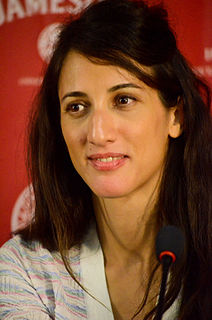A Quote by Simone de Beauvoir
Obviously, everything has always been defined by the dominant ideology. But the dominant ideology has been able to accept women's literature as well as men's literature. I would say that women have been hindered from creating for a variety of reasons, as Virginia Woolf so admirably explained in A Room of One's Own. When they have created, on the whole they have been recognized. In literature it hasn't been nearly as oppressive as in, say, painting, where even the existence of so many women painters has always been denied.
Related Quotes
If you read a lot of Chinese literature, there has always been very strong women figures - warriors, swordswomen - who defended honor and loyalty with the men. So, it's not new to our culture - it's always been very much a part of it. It's good that now the Western audience would have a different image of the Chinese women.
Women have been charged with deviousness and duplicity since the dawn of civilization so they have never been able to pretend that their masks were anything but masks. It is a slender case but perhaps it does mean that women have always been in closer contact with reality than men: it would seem to be the just recompense for being deprived of idealism.
The writers who have been serious about recreating American literature have always been far and few between. What we do have at the end of the 20th century that we didn't have at the beginning, at that time of the Lost Generation of rich white boys, is a mixture. We're now getting gay writers of color, let's say, and women of color being published. This is unprecedented.
Historically, the women who have been the great painters of the canon have very often have been the wives or daughters of supportive men. Like Artemisia, whose father was a very established painter. I will say that the two current contemporary artists I admire the most are women: Kara Walker and Swoon.
Great literature has always been written in a like spirit, and is, indeed, the Forgiveness of Sin, and when we find it becoming the Accusation of Sin, as in George Eliot, who plucks her Tito in pieces with as much assurance as if he had been clockwork, literature has begun to change into something else.
I've always really been interested in the Pygmalion myth and both what it has to say about creativity and what it has to say about relationships between men and women. I'd been thinking about what I would want to do with that if I was going to write on that theme, and one morning I woke up and Calvin and Ruby Sparks were in my head.
As both an essayist and science fiction and fantasy novelist, I write about and for the future. I talk about the past to remind us that what we believe has always been true - that men and women are somehow static categories, or that men in power has always been the default, or that same-sex love affairs were always taboo - has not always been thus.
Many women, particularly young women, have claimed the right to use the most explicit sex terms, including extremely vulgar ones, in public as well as private. But it is men, far more than women, who have been liberated by this change. For now that women use these terms, men no longer need to watch their own language in the presence of women. But is this a gain for women?
Men's ideas about what women are have been formed from their ruling caste position, and have assigned women characteristics that would most advantage their masters, as well as justify men's rule over them. They do not represent 'truth' but have been promoted as if they were, with the backing of science and patriarchal views of biology.





































